With sandy beach clubs, luxurious rooftop raves, and an endless roster of A-list DJs, Dubai is fast becoming the world’s most unexpected house music hotspots.
Dubbed the ‘Ibiza of the East’, Dubai offers its own unique style of house-driven events which brings a luxurious, high end feel to the genre of music.
A far cry from house music’s roots of underground Chicago clubs and warehouses in the 1980s, where it was raw, gritty, and anti-establishment.
House music has evolved and split into different scenes, with big-name DJs playing melodic or deep house at beach clubs with bottle service, dress codes and guest lists.
One event that embodies this new style of the house music scene is Pacha ICONS at FIVE LUXE, who have a roster of international DJs, including Solomun, CamelPhat and Afro house pioneer Black Coffee who they have on rotation.
However Dubai wasn’t always known for it’s boujee house music scene, in fact, it wasn’t until the early 2000’s that house music become popular in the UAE.
Dubai has curated its own unique style of house events and in the past 25 years the genre has skyrocketed in the country, bringing music lovers from far and wide but it wasn’t always this way.
In 2002, DJ Greg Stainer, from South East London, a prominent figure in the UK garage scene, relocated to Dubai and played a crucial role in introducing and popularising house music in the UAE.
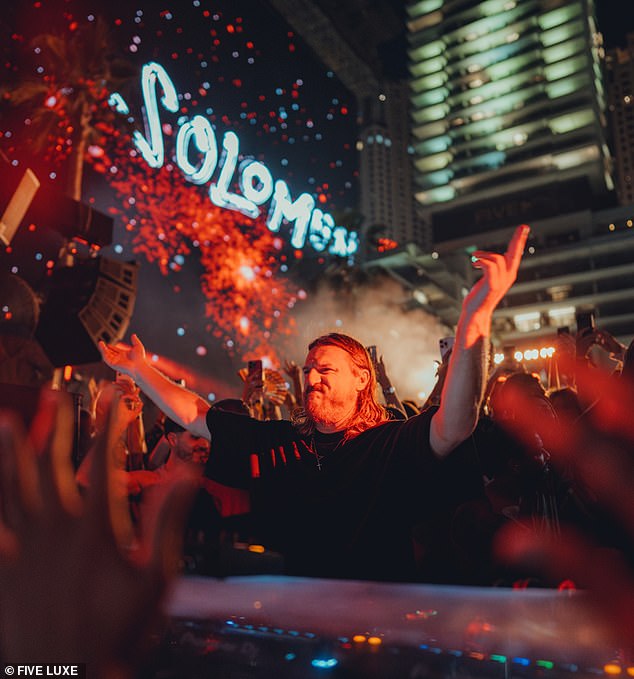
Dubbed the ‘Ibiza of the East’, Dubai offers its own unique style of house-driven events which brings a luxurious, high end feel to the genre of music
He began DJ residencies at various nightclubs in the city and started presenting a house music radio show, Club Anthems, on UAE Radio 1.
Stainer’s efforts helped bridge the gap between Western electronic music and the local audience.
Speaking to FEMAIL he said: ‘When I first emigrated there wasn’t much house in Dubai. Most clubs were playing pop, hip hop/RnB and the ones that played any house were mostly playing trance.’
Greg claimed he initially found difficult to introduce this style of music to the Dubai audience.
He added: ‘I was initially booked to play only House and Garage, but I soon realised that I had to adapt and play pop/RnB then slowly introduce pockets of house music in my sets.
‘Starting off with super commercial house and pop house remixes, so that the crowd would learn the tracks and get to know them, it took a few months and they actually started liking more “proper” house in my sets.
‘Eventually, after a few years I could do whole nights of pure house music and people would specifically come just for those house nights.’
However fast forward to today and Dubai’s house music scene is vibrant and dynamic, characterised by a blend of traditional influences and contemporary innovations.
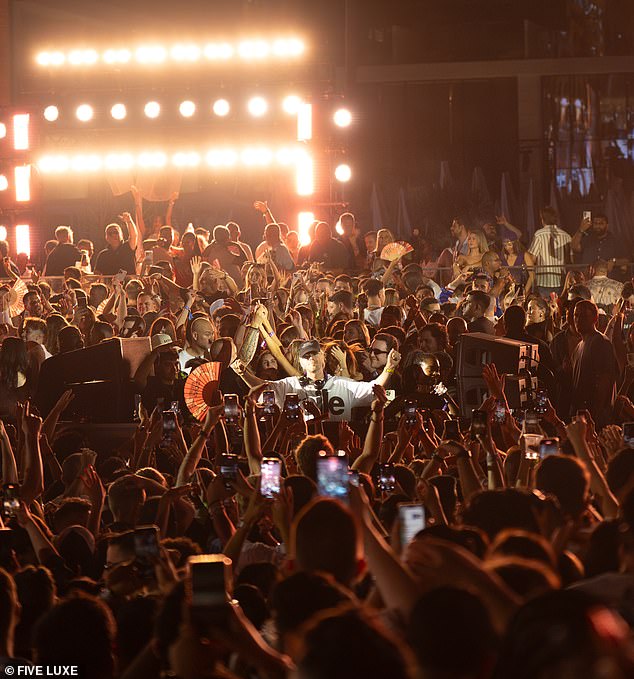
One event that embodies this new style of the house music scene is Pacha ICONS at FIVE LUXE, who have a roster of international DJs, including Solomun, CamelPhat and Afro house pioneer Black Coffee who they have on rotation
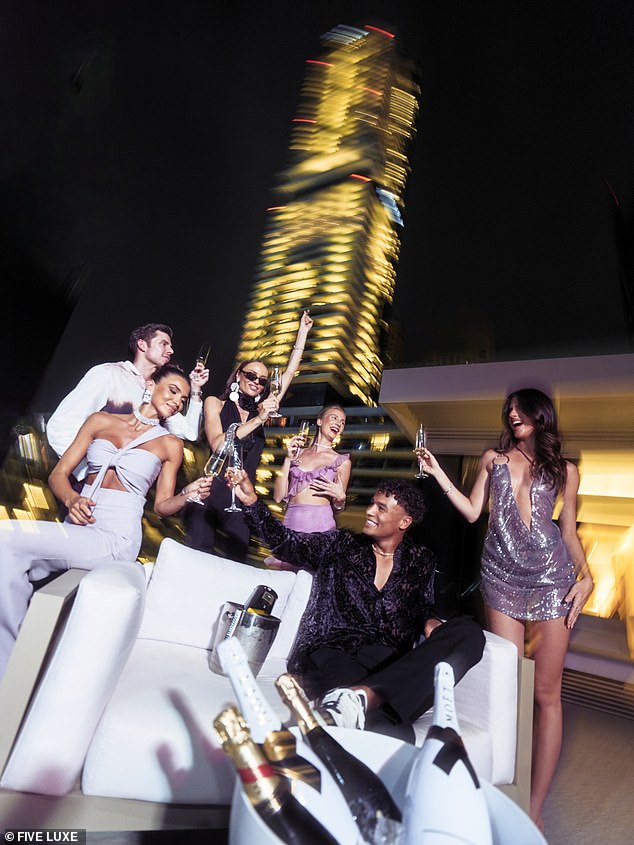
House music has evolved and split into different scenes, with big-name DJs playing melodic or deep house at beach clubs with bottle service, dress codes and guest lists
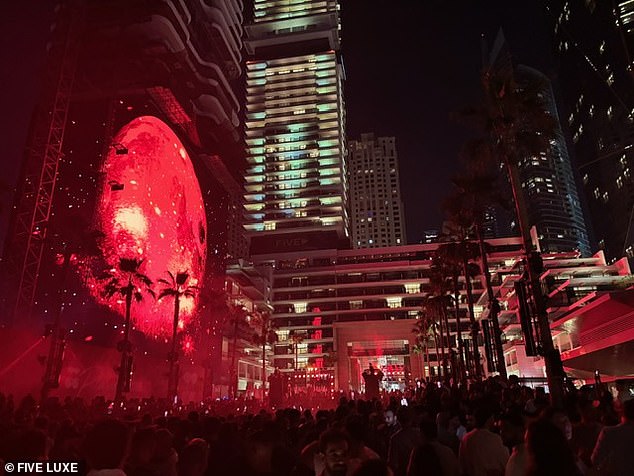
However it’s not just about the music, Dubai prides itself on high production value with lasers, dancers, bottle service and jaw-dropping locations
In May, Bosnian-German DJ Solomun, known for his signature sound that blends deep house, techno, and tech-house elements, graced the decks at Pacha ICONS.
Meanwhile just a few weeks before global house music heavyweights CamelPhat headlined the venue with support from Adam Ten.
The platinum-selling Liverpool duo have become one of the most recognisable acts in house music. As well as being GRAMMY nominated for their hit single ‘Cola,’ they have hosted residencies at top clubs worldwide.
However it’s not just about the music, Dubai prides itself on high production value with lasers, dancers, bottle service and jaw-dropping locations.
Pacha ICONS host venue Playa Pacha’s beachfront setting mirrors the Ibiza party spirit and Instagram-worthy aesthetics.
Bonnie Rakhit, travel editor, influencer and TV presenter, revealed Dubai’s music scene has many similarities to Ibiza’s.
Speaking to FEMAIL, she explained: ‘Dubai’s house music scene mirrors Ibiza’s in its focus on international DJs, expensive mega clubs and luxury open-air venues.
‘Like Ibiza, Dubai hosts world-renowned house and techno acts—such as David Guetta, Black Coffee, and Solomun, at its beach clubs, rooftop lounges, and desert festivals.
‘Timing wise, the EDM (Electronic Dance Music) loving international jet-set head to Ibiza for the summer season and then Dubai hosts their mega parties in the winter months.’
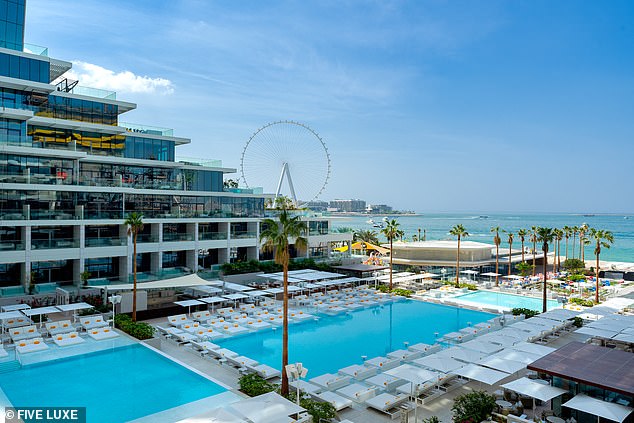
Pacha ICONS host venue Playa Pacha offers an open-air, beachfront setting for events that mirrors the Ibiza party spirit and Instagram-worthy aesthetics

While they regularly host the biggest superstars, including Lost Frequencies, Kungs, Robin Schulz, BLOND:ISH, Marco Carola, Anrey, (pictured) PAWSA and Joseph Capriati
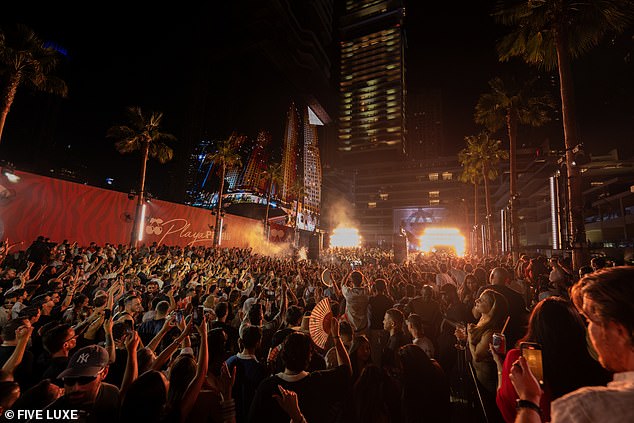
P acha ICONS is also serious about sustainability, the venue runs completely on solar power during events and has earned a top-tier LEED Platinum rating for its green design
Bonnie explained while the two hotspots offer similar party scenes, Dubai’s music scene is ‘more polished.’
She explained: ‘Ibiza is the original, the creator and incubator of the talent (if you like) and Dubai can afford to pay the same names to come and play at its luxury venues.
‘While Ibiza embodies a bohemian and free-spirited vibe, Dubai offers a more polished, high end and ordered scene.
‘For example the alcohol laws and opening times in Ibiza have a very free, liberal attitude. But in Dubai there are a lot more alcohol restrictions and stricter regulations.’
The UAE’s firm stance on drug and alcohol use ensures that house music events in Dubai maintain a polished, upscale atmosphere, setting them apart from party scenes in other global cities.
Alcohol can only be consumed by those over 21 in licensed venues or private residences with a permit.
Public drinking is strictly prohibited, and the UAE enforces a zero-tolerance policy on drug possession and use.
Bonnie added: ‘There is still an underground, raw music scene in Ibiza but Dubai’s scene is much more commercial and VIP focused.’
Meanwhile Jay Wirsig outdoor travel expert and CEO of KayaArm, claimed Dubai has something unique to offer travellers that you don’t get elsewhere.
Speaking to FEMAIL he said: ‘Dubai has carved out a very different kind of party atmosphere than what you see in places like Ibiza or Mykonos.
‘As a solo traveler, what stands out right away is the contrast between how tightly the scene is controlled and how big the productions are.
‘The venues are not just clubs but often luxury experiences with stunning views, rooftops, and private tables that feel more curated than chaotic.
‘You won’t find many spontaneous beach parties or open-air raves, but you will find high-end spaces with strong sound systems and top-tier international DJs, especially playing house and techno.
‘Unlike Ibiza, where the party can feel raw and wild and often drifts into the street or beach, Dubai keeps things sleek and confined.
‘You often need to book ahead, and dress codes are taken seriously. But the upside is you can feel safer, and things tend to run on time.’
Another reason Dubai is unique for its house music events is the season mostly runs from October to May because during the summer months it’s too hot for acts to perform, especially outside.
Fabrice, who is a DJ at FIVE LUXE, claimed the UAE is becoming the ‘ideal winter destination for the international electronic music circuit’.
He explained: ‘With its world-class infrastructure, strategic geographic location, and consistent investment in cultural innovation, the city is becoming an ideal winter destination for the international electronic music circuit—particularly as European markets enter their off-season.
‘The momentum suggests that Dubai will increasingly host flagship events, conferences, and cross-continental collaborations.
‘The Pacha ICONS series, in particular, has brought a consistent rotation of world-class artists—many of whom define the Ibiza circuit—infusing Dubai with a new level of creative and cultural capital.’
Fabrice revealed that FIVE Hotels has a ‘deep-rooted commitment to shaping the music scene in Dubai’, even adding their own music studio at The Penthouse, FIVE Palm Jumeirah so local talent and international headliners can collaborate.
The DJ revealed that Dubai is known for its own unique sound that’s ‘non-underground’ and a far cry from the original roots of house music.
He added: ‘Dubai is gradually developing its own sonic identity—one that’s accessible, polished, and distinctly non-underground.’
House music first emerged in the early 1980s in Chicago and it was a much grittier experience then we see today, with music played in underground warehouses.
US DJ, Frankie Knuckles, who was often referred to as the ‘Godfather of House,’ played a pivotal role in shaping the sound.
Knuckles, who passed away in 2014, blended disco classics with drum machine rhythms and synthesized basslines to create something entirely new.
By the mid-to-late 1980s, house music had crossed the Atlantic and found a home in the UK, with dance clubs playing a key role in spreading house music across country.
By the 1990’s the new gener already started to evolve and it branched off into different subgenres, Deep House, Progressive House, Garage and UK Garage and Tribal House.
House music also gained ground in places like Ibiza, which became a mecca for club culture.
By the 2000’s house music become more mainstream. With the rise of digital production tools and platforms like YouTube and SoundCloud, aspiring producers could share music globally without a label.
Dubai’s music scene began to embrace house music around this time, influenced by the city’s growing international community and its burgeoning nightlife.
In early 2010, the EDM (Electronic Dance Music) boom pushed house and other electronic genres into stadiums and festivals. Artists like David Guetta, Swedish House Mafia, and Avicii brought house-inspired sounds to pop music and drew in massive crowds, selling out stadiums.












